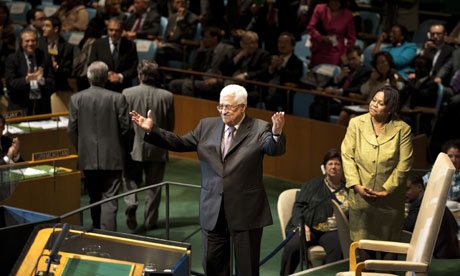The UN Security Council begins consultations Monday on Palestine’s application for full membership of the world body, although a vote on the historic bid isn’t expected for weeks.
The United States has already threatened to veto the move, insisting that only direct Palestinian-Israeli talks can set up a Palestinian state.
US President Barack Obama says the UN bid is an unrealistic shortcut that will not produce real and lasting peace on the ground between the Israelis and the Palestinians.
The mediating foursome of the United Nations, the United States, the European Union and Russia has been urgently trying to get both sides back to the negotiating table.
On Friday, the Quartet offered a counterpoint to the unilateral Palestinian bid at the UN, calling for new peace talks to begin within a month with both sides committing to seeking a final deal this year.
Palestinian leader Mahmud Abbas, riding a wave of popular support unseen in the West Bank since the late Yasser Arafat, is ruling out new talks without a “complete halt” to Israeli settlement building.
Israeli Prime Minister Benjamin Netanyahu told NBC’s “Meet the Press” program on Sunday that his advice for Abbas was: “If you want to get to peace, put all your preconditions to the side.”
The Palestinians, who pulled out of the last direct talks in September 2010 after a settlement moratorium was lifted, argue that Israel has already annexed Jerusalem and has been stealing land for the past 20 years.
“We’ve been negotiating ad nauseum with a process that had no relationship to reality. That’s the problem,” senior Palestinian negotiator Hanan Ashrawi told ABC’s “This Week” program.
“So if you negotiate and you buy Israel time to create unilateral facts, to build more settlements, to steal more land, it is in danger of destroying the whole — not just peace process — but the prospects of peace.”
Since it occupied the West Bank in 1967, Israel has built more than 130 settlements across the territory which are home to more than 300,000 residents. Another 200,000 Israelis live in settlement neighbourhoods in east Jerusalem.
Interior ministry figures show the majority of West Bank settlers live in eight large settlements which Israel wants to annex in any final peace agreement with the Palestinians.
Israel considers both sectors of Jerusalem to be its “eternal, indivisible” capital and does not view construction in the east to be settlement activity.
The Palestinians, however, believe east Jerusalem should be the capital of their future state and are fiercely opposed to the extension of Israeli control over the sector.
Abbas made history in his people’s long quest for statehood as he formally asked the United Nations on Friday to admit Palestine as a full member state, handing over a formal application to UN chief Ban Ki-moon.
He returned Sunday to Ramallah, directly to his Muqataa presidential compound, receiving a hero’s welcome from jubilant crowds applauding wildly, waving the Palestinian flag and the yellow banner of his Fatah party.
Abbas told them he had conveyed their dreams of statehood to the international community with his address to the UN General Assembly and formal submission of the membership bid.
“We went to the United Nations carrying your hopes, your dreams, your ambitions, your suffering, your vision and your need for an independent Palestinian state,” he said.
“I have no doubt that the whole free world from one end to the other received what we told them about you and your dreams with all due respect.”
The United States, a staunch Israeli ally, is one of the five veto-wielding permanent members of the Security Council, and the White House has repeatedly said Obama will use that power.
The US president has worked hard to stay on the right side of the Arab Spring and will be hoping he doesn’t have to.
To pass, the Palestinians need the support of nine out of the 15 members of the Security Council. Six have already thrown their weight behind the bid, seven have not revealed their decision, while Colombia says it will abstain.
Security Council consultations were set to begin at the UN headquarters in New York at 3:00 pm (1900 GMT), but diplomats say it could be weeks, even months, before it comes to a vote.









